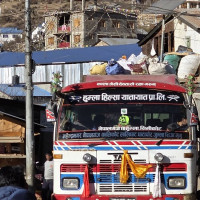- Friday, 9 January 2026
Jute losing market to plastic items
By Baburam Karki,Baraha Kshetra, Oct. 4: After planting paddy during the monsoon every year, the farmers used to relax for some time while some of them would make good use of their time producing various materials of jute (Patuwa).
Weaving ropes, carpets and other materials needed for the whole year was the daily routine of the farmers of that time. In the rural settlements of the Tarai region of eastern Nepal, after the end of the monsoon, it used to be a daily routine of farmers to make various items from Patuwa.
Pachandan Kavirath, 82, recalled the routine of making ropes from the jute taken out during the rainy season that would fulfil the need for the year round and said, "Nowadays, because plastic materials are available in the market, farmers don't plant jute anymore."
Plastic products are cheaper and better-looking than the materials made from Patuwa and since they are available widely, Patuwa products have ceased to be seen in village houses. In the name of modernity, the existence of traditional technology and tools are disappearing. Traditional household items, old technical items and traditional items are seen no more in the village.
Until two decades ago, Patuwa was used in farmers' houses to tie cattle and to light traditional oil-fed lamps. Every farmer used to have ropes made from it for every ocassion. They used to be busy making ropes by using original and traditional skills and from locally available materials.
Ancestors used to make the things for their daily life by themselves. And most of those skills were transferred while the later generations would add some creativity to that skill.
As there is no generational transfer, the handicrafts made from Patuwa and the skills needed to create them are disappearing. Jangali Kavirath, 54, of Baraha Kshetra-9 said that he is still using the items made by his father 25 years ago.
He complained that the skills of his parents were disappearing as he did not pay attention to learn it. Many of today's youth may be surprised that ropes were also made from Patuwa.
Earlier, most of the farmers living in rural areas used to cultivate jute. Bir Bahadur Karki of Prakashpur said that now neither jute cultivation is done nor ropes are woven.
Murali Kavirath, 78, also said that the skills and arts materials made from Patuwa, which are directly related to the daily life of the village, have disappeared. In Tarai settlements, the mats made from Patuwa are no longer seen.
Pawan Kavirath Mandal, 44, of Baraha Kshetra-9, Kauwatoli, said, "I could not acquire the skill of my father because I was not interested in it at that time." The mat prepared from Patuwa was considered good from the point of view of health as well.
Netra Bahadur Ghimire, 70, said that since there are no people in the village who have the skills to make these kinds of items, the skills and arts of making things from Patuwa have also disappeared.
"The present generations do not even know about such materials. Some of the goods have reached a state where they cannot be found," he said.



-original-thumb.jpg)













